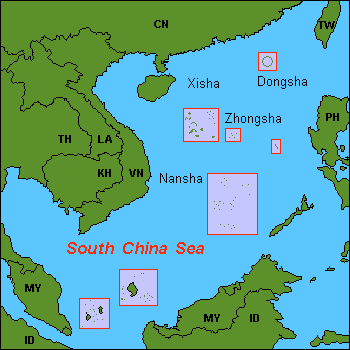|
Editor's note: The South China Sea issue has been put under the spotlight in recent weeks. Tensions have been escalated, with Vietnam and the Philippines claiming parts of the potentially resource-rich islands as their territory. China has declared its sovereignty over islands in the South China Sea and the surrounding waters. So what historical evidence supports China's claim? What's behind the South China Sea dispute? What are the best options to resolve the dispute? We have gathered opinions from experts, commentators and our readers to help you understand the issue. |
 |
![]()
|
 |
China was the first to discover, name, develop, conduct economic activities and exercise jurisdiction on those islands. There were detailed descriptions of the geography and specific positions of the various islands of the Nansha and Xisha groups in the Song Dynasty (960-1279).??(Full) Liu Nanlai is a member of the Permanent Court of Arbitration (PCA) at The Hague and an expert on International Law.
Two incidents in the last century, however, establish China's sovereignty over the Xisha and Nansha Islands. In 1909, Zhang Renjun, then governor of Guangdong and Guangxi, evicted a Japanese merchant who was illegally occupying part of the Dongsha Islands. After that, he realized the necessity of defending the other islands in the South China Sea and asked navy commander Li Zhun to patrol the waters off the Xisha Islands with three warships. (Full) Li Jinming is a professor at the Center for Southeast Asia Studies, Xiamen University, Fujian province.
All the evidences both past and present prove that China is the sole and legitimate owner of both the Nanshan and Xishan Islands. Don't use China's peaceful rise to twist the debate to force the Chinese not to take action on its historical claim over its legitimate territories. China should strongly enforce its sovereignty over them.? Nanyang Chinese, on China Daily website? |
![]()
|
US Secretary of State Hillary Clinton rekindled feuds among concerned parties over the issue when attending the ASEAN Regional Forum on July 23, 2010. She made a direct link between US national interests and the South China Sea issue. Since then, many analysts in Asia believe the South China Sea issue could be an ideal stepping stone for Washington to meddle in Asian affairs. The current tension over the issue would not have broken out without the US factoring in it. (Full) Wang Hui, China Daily columnist? External forces could have prompted these two Asian countries to stir up trouble over the South China Sea. They may count on the backing of another country as a major bargaining chip. Indeed, the current tension could not have arisen without the involvement of countries not directly concerned. (Full) The US likes to have a finger in every pie. China should give them the finger and say "You don't bother me, I don't bother you!". If the Philippines and Vietnam have any backbone, they should tell the US to bog off and shut up, and to leave Asia business with the Asians. As we know, most things the US touch tend to break, and it has a habit of turning a drama into a crisis. Sentinel, on China Daily website |
|
![]()
|
I think the countries should resolve the disputes through peaceful and friendly ways, including political consultation and negotiations. The Chinese government has also put forward the proposition of "shelving disputes and going in for joint development". China is ready to shelve the disputes for the time being and conduct cooperation with the countries concerned, pending settlement of the disputes. (Full) Liu Nanlai is the member of the Permanent Court of Arbitration (PCA) at The Hague and an expert on International Law. |
China should let its policies be known to the international community. First, China should tell the international community clearly and confidently what its stand on the South China Sea issue is to ensure that other countries in the region do not misunderstand or misjudge it. (Full) Jin Yongming is a law scholar with the Shanghai Academy of Social Sciences and Academy of Ocean of China
|
China has every right to defend its sovereignty and territorial integrity, including with force if necessary. But the best solution is diplomatically and bilaterally with the countries concerned.
Han, on China Daily website
|


